Massive Russian Mobilization in the Arctic, High North News' overview shows
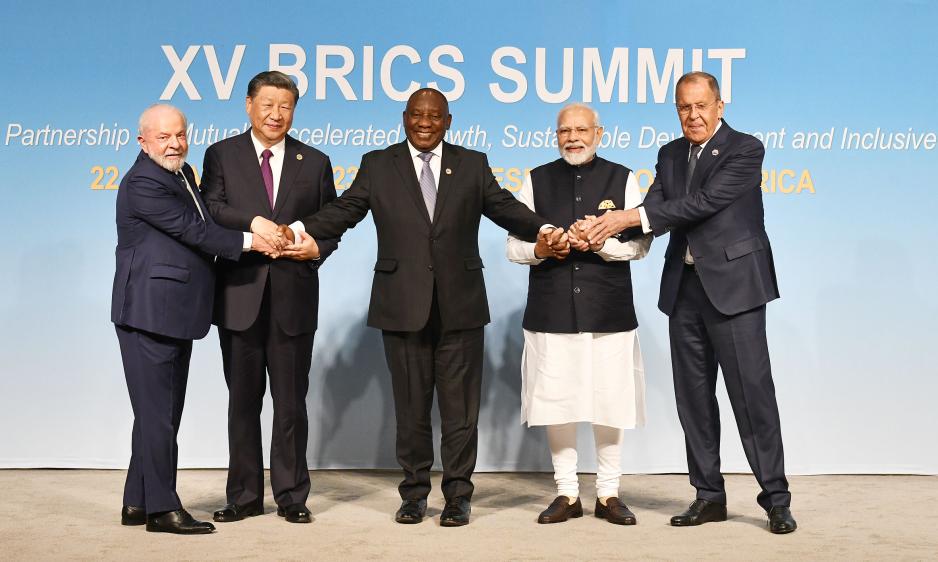
Russia, here represented by MFA Sergei Lavrov, reaching out a hand to the BRICS countries for cooperation within a number of spheres and parts of the world – not least in the Arctic. Here, Lavrov attends the BRICS summit in South Africa last Wednesday with the cooperation format's state leaders: (from the left) Brazil's President Lula da Silva, China's President Xi Jinping, South Africa's President Cyril Ramaphosa, and India's Prime Minister Narendra Modi. (Photo: CGIS)
Moscow is leaving the door open for "effective work in the Arctic Council" – while also continuously opening new doors for cooperation in the Arctic with non-western states. Interaction in fields such as research, environmental protection, logistics, energy, and tourism are on the agenda.
"Russia will continue to participate in the Arctic Council's work, like the other countries. We are interested in effective work within this body," said the country's Arctic ambassador, Nikolay Korchunov, to TASS in mid-August.
At the same time, Moscow is seeking cooperation in the Arctic with a long line of non-Arctic groups and states outside of the West – such as BRICS (Brazil, India, China, and South Africa), the Shanghai Cooperation Organisation (China, India, Iran and the -stan countries), as well as various countries in Latin America, the Middle East, and Asia.
This is consistent with the approach Korchunov outlined in May as Russia handed over the chairship of the Arctic Council to Norway: Moscow will play the field when it comes to cooperation in the region.
A review of the Russian cooperation agenda in the Arctic with the West and 'the Rest' follows.
But first, let us refresh:
– The Arctic Council is an intergovernmental forum for cooperation between the region's eight states (Canada, Denmark, Russia, the US, Norway, Iceland, Finland, and Sweden), indigenous peoples, and other inhabitants in joint Arctic issues – especially within sustainable development and environmental protection.
– After Russia's full-scale invasion of Ukraine, the council's work was put on hold by the seven Western Arctic states.
– On its side, the council's Russian chairship continued with its program – and carried out a number of events with participation from "friendly countries", such as China, Brazil, Mongolia, Belarus, and Kazakhstan.
– In June 2022, the seven Western Arctic states resumed some project work within the Arctic Council without Russian participation.
– Since the 11th of May, the search for future solutions for the Arctic Council has taken place under a Norwegian chairship.
Moscow's starting point
"The future of the council is obviously a concern. However, Norway is in a position to keep the organization going and to restore the council to its original format," stated Korchunov during the press conference for handing over the baton to the Norwegian side.
The ambassador also said that there were no Russian plans to develop alternative forums to the Arctic Council.
At the same time, he emphasized that Russia's willingness to remain in the council requires that its work still serves Russian interests – and that the country's member rights are respected.
Failing to invite Russian representatives to events within the council will violate these rights – and in that case, Russian participation in the organization's activities will hardly be possible, said Korchunov to TASS in the middle of May.
In the same interview with the Russian news agency, he also elaborated on how Moscow orients itself:
"Our line in the Arctic Council will depend on the situation's further development and respect for Russian interests. With the council's weakened role and effectiveness, provoked by our Western partners, we are already engaged in active dialogue with an Arctic agenda in various formats with other countries and organizations."
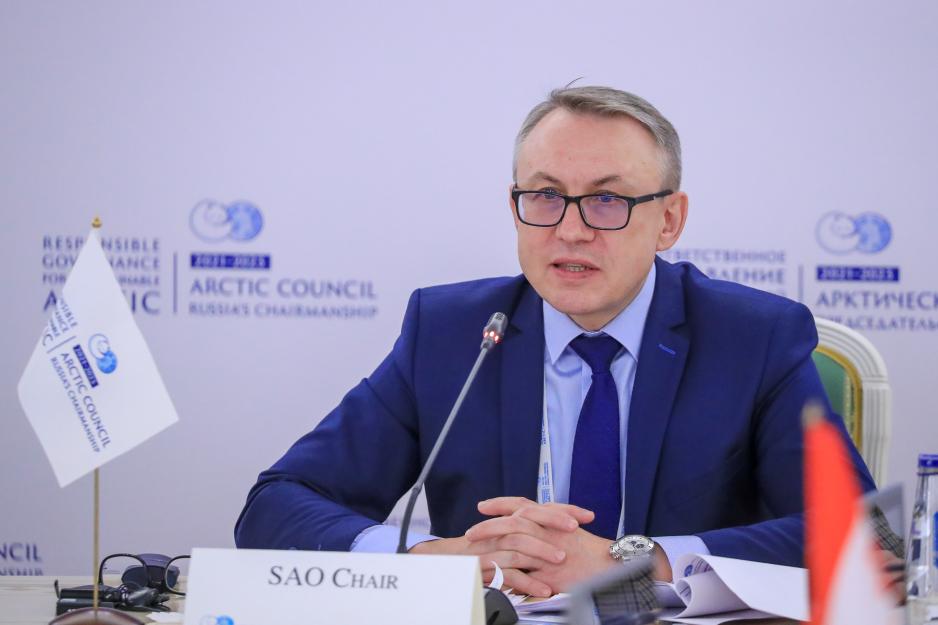
Nikolay Korchunov, Russia's Arctic Ambassador. He was head of the former Russian chairship of the Arctic Council. (Photo: Vyacheslav Viktorov/Roscongress).
Recent Russian signals
Now, the Norwegian chairship has, according to the top Russian diplomat, announced a wish to resume activity in the council's working groups (presumably with Russian participation) "already in the fall." This was reported by TASS on August 11th.
"But we see that it is not easy for the Norwegian chairmanship to do this in light of the respective position of some other Arctic countries," Korchunov added.
He also expressed, as mentioned initially, Russian interest in "effective work" within the council – and drew the following picture of the situation:
"We see an increase in non-military dangers and security challenges that have been successfully managed by the Arctic Council – in areas such as emergencies, like oil spills; biological diversity; combating marine litter; introduction of resource-saving technologies; and preservation of indigenous peoples cultural and historical heritage. It worries us that such work has been suspended."
During the St. Petersburg International Economic Forum in June, Korchunov was particularly concerned about the lack of activity in the Arctic Council's working group for the Conservation of Arctic Flora and Fauna. The ambassador pointed out that climate change and more economic activity are constantly increasing the pressure on Arctic nature, writes TASS.
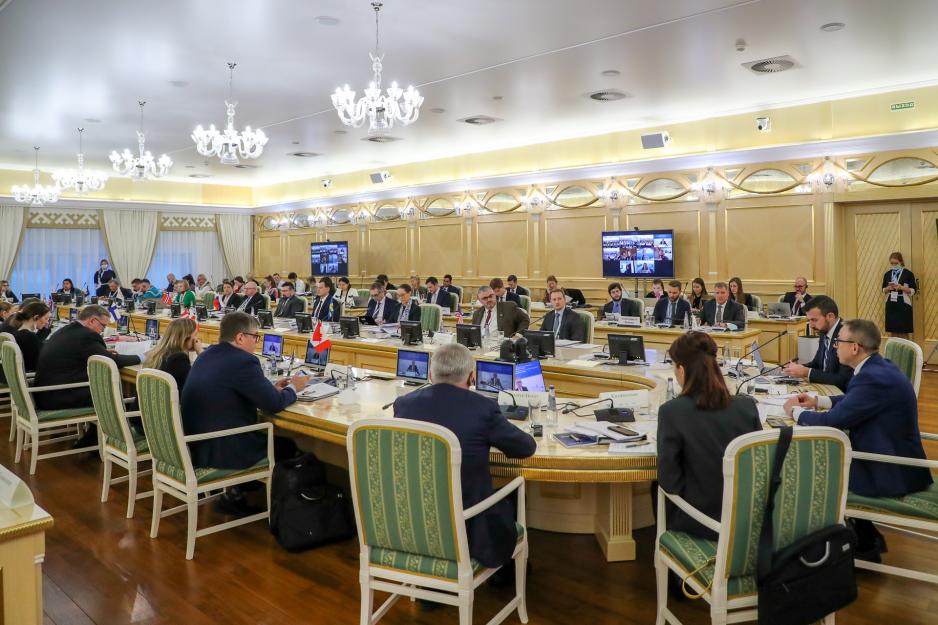
The time when 'the whole world' was gathered for Arctic cooperation: In December 2021, Nikolay Korchunov (right) chaired the first plenary meeting for senior Arctic Officials in the Arctic Council under Russia's chairship. Also present were representatives of the six indigenous organizations that are permanent participants in the council, as well as representatives for the council's six working groups and for the 13 non-Arctic countries and many organizations with observer status. (Photo: Vyacheslav Viktorov/Roscongress)
Open arms
Russia's incursive dialogue about the Arctic agenda is taking place, as mentioned, with a large number of "friendly countries".
"Contacts with the BRICS and SCO countries are actively being developed. A number of bilateral projects are being prepared in areas such as scientific research, logistics, environmental protection, and maritime cooperation," Korchunov stated in the aforementioned TASS interview in May.
China and India are referred to as strategic partners and are perhaps particularly welcome to cooperate – also within the economic development of the Russian Arctic. This can likely be attributed to the Northern Sea Route.
Brazil is also specifically referred to by the Russian ambassador.
"Given the upcoming Russian chairship of BRICS, we can involve BRICS members in joint work in the Arctic region – within various formats and in different areas. For example, Russia and Brazil have many possible fields of cooperation. Among those are work to preserve ecosystems in the Arctic, approaches to protect indigenous people and their development, as well as energy cooperation, including the use of renewable energy sources," he said to TASS in June.
According to Korchunov, Russia also sees possible partners in Latin America and the Persian Gulf. In addition, Turkey and Thailand are possible partners.
Read more about the forums behind the abbreviations – and three cases that show how Russia seeks to materialize Arctic cooperation with the non-Arctic world:
BRICS and its recent summit:
– BRICS is a cooperation forum for Brazil, Russia, India, China, and South Africa, first introduced in 2006 and initiated by Russia. The inspiration for the cooperation framework was found in their rapidly growing economies and increasing political influence in the world (vis-à-vis the West).
– From the 22nd to the 24th of August, there was a BRICS summit in Johannesburg, South Africa, in a so-called 'BRICS Pluss/Outreach format'.
– Russia's delegation for the meeting was led by MFA Sergei Lavrov. President Vladimir Putin participated digitally as South Africa is obliged to arrest him following an arrest warning from the International Criminal Court.
– Argentina, Egypt, Iran, the United Arab Emirates, Saudi Arabia, and Ethiopia were announced as new members of the forum from the New Year and onwards.
– Next year, Russia will take over the chairship of BRICS. According to Putin, developing relations within the new plus format will be prioritized.
– A total of 40 countries are said to have expressed an interest in joining the group, according to the group itself. New rounds of expansion will follow, says South Africa's president.
– In the declaration of the summit, the BRICS states commit to continued interaction within politics and security, economy and finance, as well as culture and people-to-people cooperation. They will also “promote peace; a more representative, just international order; a revitalized and reformed multilateral system; sustainable development and inclusive growth".
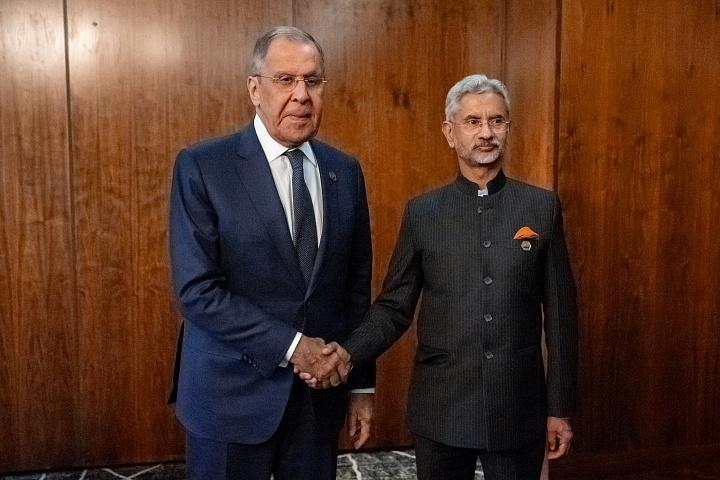
Last Wednesday, Russian MFA Sergei Lavrov and Subrahmanyam Jaishankar, India's Minister of External Affairs, met in Johannesburg. The ministers discussed, among other things, cooperation within BRICS and practical measures to expand the countries' cooperation in trade, finance, and logistics. (Photo: the Russian Ministry of Foreign Affairs)
Shanghai Cooperation Organisation
– The Shanghai Cooperation Organization (SCO) is a regional intergovernmental cooperation organization with nine members: Russia, India, China, Kazakhstan, Kyrgyzstan, Pakistan, Iran, Tajikistan and Uzbekistan.
– The SCO's aim is to strengthen good neighborly relations, promote effective cooperation in a number of social areas – and ensure peace, security, and stability in the region.
– The organization also seeks to promote "a new democratic, just and rational international political and economic order".

The SCO held its 23rd summit in July via video link. Here, India's Prime Minister Modi (in the middle) speaks with listeners such as China's President Jinping (number three from the far left) and Russia's President Putin (top right). The meeting also included observer states and dialogue partners. (Photo: India's Ministry of External Affairs)
The Snezhinka (Snowflake) International Arctic Station
– The Snezhinka ('snowflake') International Arctic Station is to be built on the Yamal Peninsula in northwest Siberia. According to the plan, this will become an autonomous, year-round research and development complex powered by renewable energy and hydrogen.
– The facility is intended as a platform for international collaboration between engineers, researchers, and students.
– Here, they will be able to test and demonstrate environmentally friendly life support technology, new materials, and systems for smart houses and communities – as well as biotechnological, medical, robotic, and AI-driven solutions. Relevant research areas are also climate change, ecology, and environmental pollution.
– The project was launched in 2020 by the Moscow Institute of Physics and Technology, with support from several Russian ministries and regional authorities.
– In February, Russia invited the countries of Latin America and the Persian Gulf to cooperate at the Snezhinka station during a major ambassadorial meeting, reported TASS. (Latin America: States in South and Central America with Spanish or Portuguese as an official language, such as Brazil and Argentina. The Persian Gulf: Iran, Iraq, Kuwait, Saudi Arabia, Bahrain, Qatar, United Arab Emirates, and Oman.)
– The Moscow Institute of Physics and Technology also has an open invitation for foreign partners to participate in the project.
– It is not yet known when construction will start, but the first phase of operational testing is said to be taking place at the end of 2024.
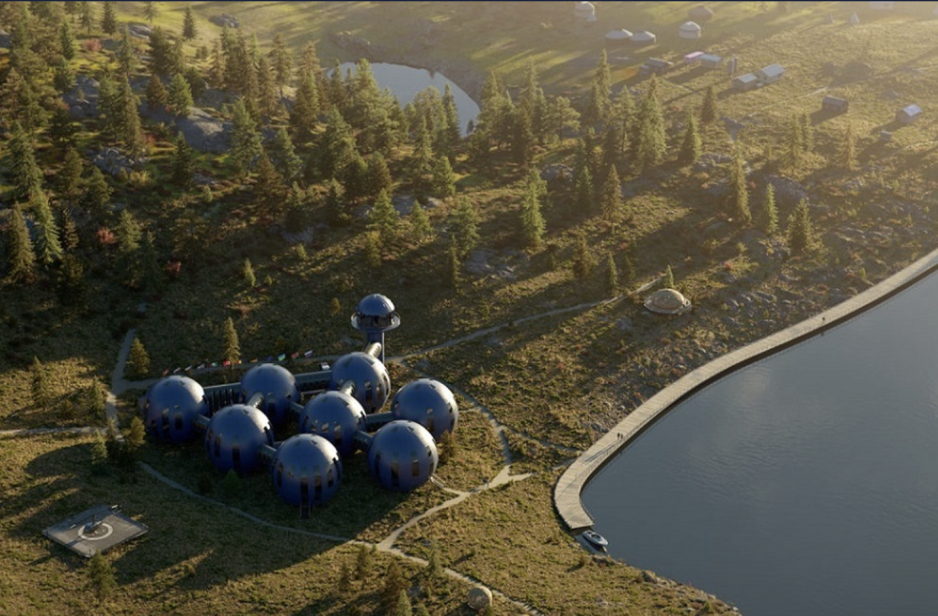
The Snezhinka (Snowflake) International Arctic Station will resemble a snowflake, hence the name. It will be built by a lake around a two-hour drive from the town of Salekhard and will, according to the plan, function as a scientific workplace and residence for at least 80 people simultaneously. (Screenshot from the website of the Snezjinka station)
International arctic science station on Svalbard
– Trust Arktikugol, Russia's company in Svalbard, will develop an international Arctic science station together with BRICS and other "friendly countries". The project was launched in April by Aleksey Chekunkov, Russia's Minister for Development of the Far East and the Arctic.
– Later that month, Trust Arktikugol obtained expert support for the development work by entering into a cooperation agreement with a university in Arkhangelsk. This also includes the establishment of international education programmes.
– Negotiations around the project are ongoing with BRICS countries and other states – and China and India are among those interested, read Chekunkov's update to TASS in May.
– Russia envisages designing the science station on Svalbard on the model of the aforementioned Snezhinka station and allocate similar tasks to it, the same minister announced in June to TASS.
– In July, TASS also reported that Turkish and Russian scientists have agreed to collaborate on Svalbard – and that Turkey is interested in participating at the planned science station. This agreement was reached when Turkey's Arctic scientific expedition team visited the Russian research center in Barentsburg.
– Thailand could also be a possible interested party. In August, the Thai ambassador to Norway visited the Russian settlements on Svalbard – and was introduced to existing and planned scientific activities on the archipelago, according to Russia's Ministry of Foreign Affairs.

Thailand's ambassador to Norway, Vimolbajra Ruksakiati (second from the left), visited the Russian settlements on Svalbard in mid-August. With Russia's Consul General Andrei Chemerilo (third f.v.) as host, she was given a tour of the above-mentioned science center in Barentsburg, among other things. According to the Russian Foreign Ministry, the ambassador expressed "Thailand's interest in continuing traditionally beneficial and friendly relations with Russia, including their possible development in the archipelago." (Photo: Russian Ministry of Foreign Affairs)
The Russian-Asian Research Consortium
– A Russian-Asian consortium for Arctic research (RACAR) was established last summer to develop joint projects, e.g., within sustainable development.
– As of April, the consortium brought together 16 scientific and educational institutions and has its headquarters in Yakutsk in Eastern Siberia, Russia.
– This is a mechanism to promote cooperation with China and India in particular, Korchunov stated to TASS in June. "Moscow welcomes the presence of Beijing and New Delhi in the Arctic region and is ready to develop cooperation with them in this area," he said.
– The initiators of the consortium were the North-Eastern Federal University in Yakutsk and the Northern Forum, an Arctic interregional organization.
– TASS reported that the consortium launched plans for several Russian-Chinese projects in April. These concern attracting Chinese tourists to the Russian Arctic, implementing Chinese medicine in Russia, and obtaining industrial partners from both countries to develop the Northern Sea Route.
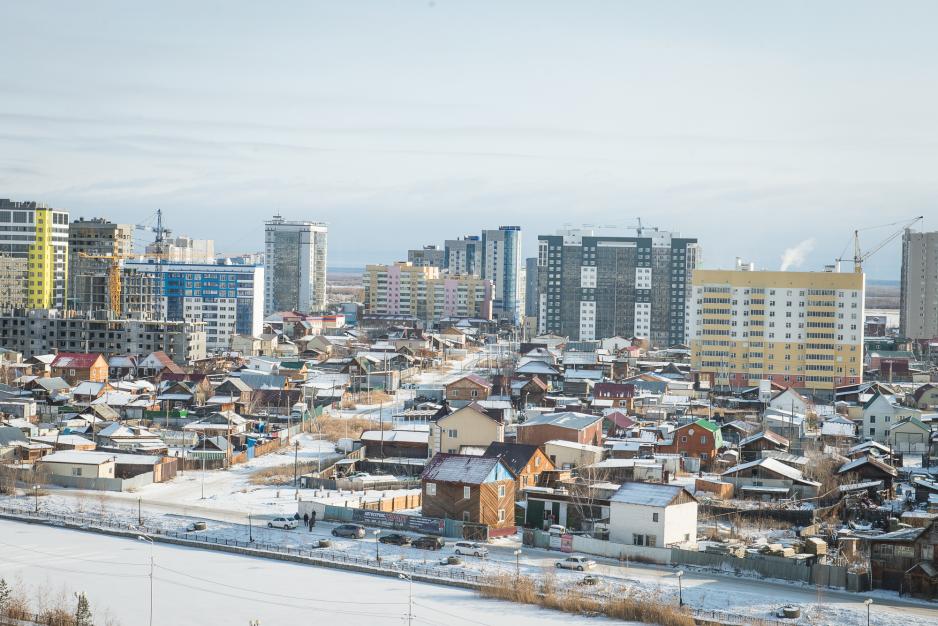
The Russian-Asian Research Consortium has its headquarters in Yakutsk – the world's largest city built on permafrost. (Photo: Якупова Инна, CC BY-SA 4.0, Wikimedia)
Also read
This article was originally published in Norwegian and has been translated by Birgitte Annie Molid Martinussen.



